AZERBAIJAN: DIASPORA ORGANIZATION TRIES TO COUNTER ARMENIAN-AMERICAN INFLUENCE IN WASHINGTON
Jessica Powley Hayden 5/08/09
A new front has opened in the Azerbaijan-Armenia conflict and it is centered in Washington, DC. Frustrated by the effectiveness of Armenian-American advocacy groups to shape debates in the United States, Baku is now looking to its diaspora for a little public-relations support.
Last year, a group of Azeri-Americans founded the US-Azeri Network (USAN), which advertises itself as a grassroots advocacy organization. The new, Washington, DC-based group hopes to connect Azeri-American voters to promote a pro-Azerbaijan agenda in the United States.
That agenda is a point-by-point refutation of policies sought by the Armenian-American advocacy groups: increased aid to Azerbaijan; decreased aid to Armenia; the elimination of humanitarian aid to the breakaway region of Nagorno-Karabakh; the immediate withdrawal of Armenian forces from Karabakh; and recognition of massacres perpetrated against Azerbaijanis by ethnic Armenians in 1918, marked in Azerbaijan as the “Day of the Azerbaijani Genocide.”
USAN casts itself in the role of the underdog. “[Azeri-Americans] see that political activism can go a long way… [W]e can achieve a lot and ’compete’ with the big boys like the Armenian diaspora and its lobby,” commented USAN Executive Director Adil Baguirov.
It will be an uphill challenge. If garnering aid from the United States were a competition, Armenia would clearly be winning. From 1992 to 2007, Armenia received almost $2 billion worth of assistance from the United States ($1,745,930), while Azerbaijan came away with about a billion less: $743,400,000.
In addition to lobbying for limits on aid to Azerbaijan, Armenia has invested substantial resources into lobbying US legislators and the president to recognize as genocide the Ottoman Turks’ slaughter of an estimated 1.5 million ethnic Armenians in 1915.
Armenian advocacy and lobby groups also have a long history of promoting Armenian policies among American lawmakers. Armenian political action committees (PACs) contributed nearly $200,000 to various races across the US in the 2008 election cycle, according to Federal Election Commission documents.
Rough estimates put the size of the Armenian-American population at nearly 1 million.
Azeri-Americans are less organized, young, far fewer in estimated number (some 400,000, according to USAN), and have not had as much success in getting their agenda before US policymakers.
In meetings on Capitol Hill last summer, Azerbaijani parliamentarians were told: “Look, Armenians are my constituents and I am accountable to them,” recounted Petro Morgos who runs the parliamentary program at DAI (Development Alternatives, Inc.), an international civil-society development organization, and attended the meetings.
USAN believes that American politicians are not getting the whole story. In addressing the American public, USAN’s Baguirov states that his organization covers what it terms “crimes against humanity and genocidal acts perpetrated by Armenians against Azerbaijani, Turkish, Kurdish, Jewish, and other civilians in the Caucasus and East Anatolia since the 19th century, culminating more recently with the Khojaly Massacre in 1992.”
Hundreds of Azerbaijani civilians were killed – according to Baku, by Armenian forces – trying to escape from the village of Khojaly in Karabakh during the war between Armenia and Azerbaijan over the territory. The Armenian government blames Azerbaijani forces for their deaths.
Azerbaijan’s emphasis on informing foreigners about alleged acts of Armenian aggression can also be seen in Baku. In April, Fazil Mustafa, a member of the Milli Majlis, proposed creating a genocide museum in Baku, emphasizing its value in educating foreign guests. A museum already exists in Yerevan that chronicles the events of 1915.
The recent push to energize Azeri-Americans to promote Azerbaijan’s interests appears to be the result of frustration within Azerbaijan itself. In 2006, President Ilham Aliyev accused Armenian-American groups in the United States for distorting Azerbaijani history. Aliyev, at the time, suggested that Azerbaijan would cultivate its own diaspora.
Since Aliyev’s speech, an Azerbaijani consulate has been opened in Los Angeles. Consul General Elin Suleymanov explained that Los Angeles was chosen in part because of the large Armenian Diaspora located in California. “We wanted Azerbaijan’s voice to be heard on the West Coast and for public opinion not to be shaped by the Armenian side alone,” he told EurasiaNet.
Another diaspora-based organization, the Azerbaijan-American Council, was opened in California in 2006 with the “primary purpose of facilitating active integration of Azerbaijani-Americans into U.S. public life and strengthening Azerbaijani-American identity.”
Suleymanov, however, cautions that focusing too heavily on “narrow ethnicity-based ideology” is counterproductive to achieving peace in the region. “Unfortunately, some in the Armenian community still focus on the past and see our region in simplified, confrontational terms,” he said.
“I think focusing on the future, not that past – without, of course, either forgetting or ignoring the latter – is the best way forward for our part of the world,” Suleymanov said.
USAN’s public relations campaign to bring attention to the past, though, is beginning to pay dividends. Several members of the US House of Representatives have made official remarks in the Congressional Record commemorating the Khojaly massacre. Nevada Governor Jim Gibbons released a proclamation recognizing March 31 as “Azerbaijani Remembrance Day.”
The Nevada proclamation sparked a firestorm in the Armenian-American community, which objected to the proclamation’s definition of Azerbaijan as including Nagorno-Karabakh. “The Armenian-American community throughout the state of Nevada is shocked that Governor Gibbons was so easily misled and manipulated by foreign interest groups representing the governments of Azerbaijan and Turkey and their high-priced lobbyists,” stated Razmik Ablo, spokesman for the Armenian National Committee.
The “high-priced lobbyist” tag is one that is commonly used against USAN. But Baguirov claims his organization has a “very modest operating budget which is fully raised from our grassroots.” He declined to give an exact figure. Combined with its sister organization, the US Turkic Network, USAN claims it has 15,000 members.
While Baguirov is optimistic that USAN’s influence over American policy will increase with time, it concedes that, as a numbers game, diaspora Armenians will continue to exert greater influence in American politics. “Obviously, we are the David in this story, but we are very content with what we were able to achieve in such a short time-span,” Baguirov said.
Editor’s Note: Jessica Powley Hayden is a freelance reporter based in Baku.







 Recep Tayyip Erdogan will start his visit to Azerbaijan on May 12, CNN Turk informs. The Turkish prime minister will have meetings in the capital Baku on May 13.
Recep Tayyip Erdogan will start his visit to Azerbaijan on May 12, CNN Turk informs. The Turkish prime minister will have meetings in the capital Baku on May 13.
